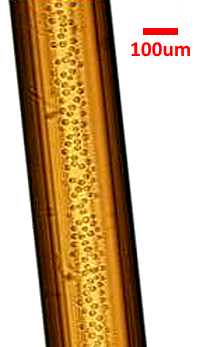|
To view this email as a web page, click here. |
 |
|
Welcome
Your backup and recovery strategy is an important safeguard in case of a disaster.
This month's highlighted publication shows a new approach to prepare digested samples from a few cells.
If you have a recent publication that you would like us to consider for an upcoming Newsletter, please
send us a PDF or a URL.
Mascot tip of the month highlights a surprising problem you might encounter when creating a spectral library from search results.
Please have a read and feel free to contact us if you have any comments or questions. |
|
|
|
 |
 |
 |
|
Disaster, backups and recovery
There are a number of unpleasant scenarios where, through no fault of your own, your Mascot Server or other data systems become incapacitated. Disk, board, or controller failures as well as ransomware and computer viruses may happen, so it is worthwhile having some safeguards in place.
We always recommend backing up your raw data files as they are often irreplaceable. You could just back up the raw data and recreate the results as needed, but with the amount of time and work that goes into the data analysis, especially for quantitative data sets, it is better to back up the results as well, especially as storage is cheap.
If the worst has happened, and your Mascot Server is down and maybe other computer systems too, hopefully you have all your data in a secure location. Recovery starts from the Mascot Server and works backwards to Mascot Distiller and Daemon. During the recovery process restoring the large amount of data associated with Mascot Server may take a long time so it may be worthwhile to use a special file copying program to speed up the process.
We have a number of helpful suggestions about what to back up and how to restore your system in the full article.
|

|
 |
 |
 |
|
Featured publication using Mascot
Here we highlight a recent interesting and important publication that employs Mascot for protein identification, quantitation, or characterization. If you would like one of your papers highlighted here please send us a PDF or a URL.
|
|
|
In-Line Sample Processing System with an Immobilized Trypsin-Packed Fused-Silica Capillary Tube for the Proteomic Analysis of a Small Number of Mammalian Cell
Kosuke Hata, Yoshihiro Izumi, Takeshi Hara, Masaki Matsumoto, and Takeshi Bamba
Analytical Chemistry 92 2997-3005 (2020)
The authors have developed a sample preparation method for the analysis of a low number of mammalian cells by enabling efficient digestion and minimizing sample loss. The method uses in-line sample preparation for efficient cellular proteomics (ISPEC) with nano-LC/MS/MS analysis.
Using a micromanipulator and a nano-syringe pump connected to a fused-silica capillary, they aspirated sequentially first a lysis solution and then the HeLa cell suspension into the capillary. With the HeLa cell suspension of approximately 200 cells/µL, they used 5 nL for 1 cell, 50 nL for 10 cells, etc. The number of cells collected in the capillary was confirmed by counting using a microscope.
The cells were then eluted, lysed and digested in immobilized trypsin. The peptides were trapped at the top of the nano-LC column before elution to LC/MS/MS. They were able to identify 1351, 351, and 60 proteins from 100 cells, 10 cells, and single cells, respectively.
|
 |
 |
 |
 |
|
Mascot Tip
Mascot Server makes it is easy to create a spectral library by crawling your search results. If you've ever tried this, you will have noticed that one of the filters is a date range and that the default start date, in order to capture everything, is 1970-01-01.
This worked just fine from when we first added spectral library support in 2016 through all of the development and testing of the latest release, Mascot Server 2.7. Then, early this year, we discovered some attempts to create spectral libraries were failing.
The problem turned out to be a variation on the Y2K problem. The POSIX functions for turning a Unix epoch timestamp into date-time components return the year as the number of years since 1900. That is, they return 70 as the year for any date in 1970. Until the end of 2019, the Perl functions used to format the date treated 70 as 1970, and everything worked just fine. Unfortunately, we weren't aware that in 2020, the same Perl functions would start to treat 70 as 2070.
We'll fix this in the next release. Meanwhile, if you crawl result files to make a spectral library, just make sure to set the start date to something more recent than 50 years ago!
|

|
 |
 |
 |
|
About Matrix Science
Matrix Science is a provider of bioinformatics tools to proteomics researchers and scientists, enabling the rapid, confident identification and quantitation of proteins. Mascot software products fully support data from mass spectrometry instruments made by Agilent, Bruker, Sciex, Shimadzu, Thermo Scientific, and Waters.
Please contact us or one of our marketing partners for more information on how you can power your proteomics with Mascot.
|
 |
 |
|
|